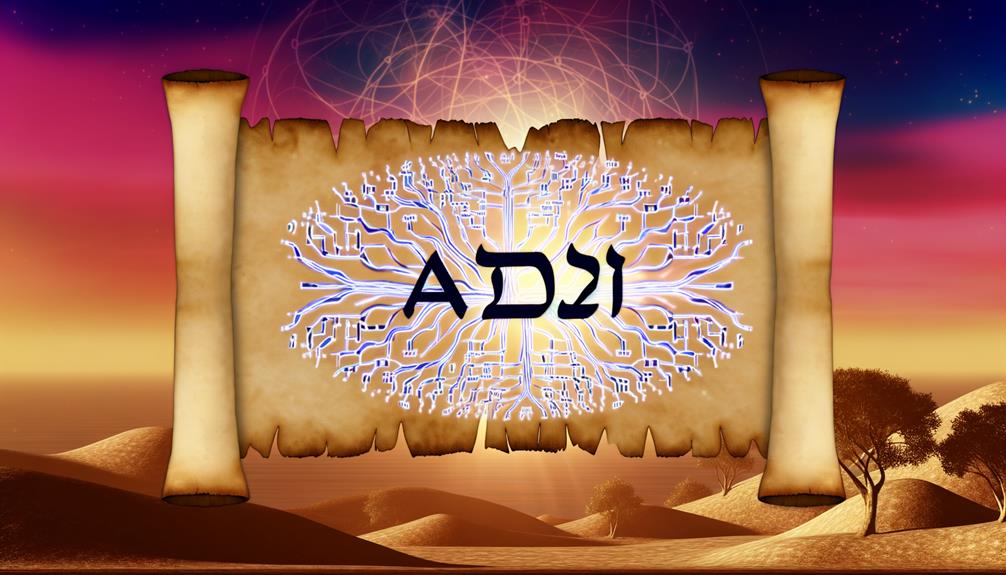Adi Meaning in Bible Verse: Beginning and Foundation
The name ‘Adi‘ in the context of Bible verses, though not directly mentioned, carries profound significance in Hebrew tradition. Originating from the Hebrew term for ‘ornament’ or ‘jewel,’ it symbolizes divine favor, beauty, and perpetual covenants.
Scriptures such as Isaiah 61:10 and Ezekiel 16:11-13 emphasize these themes, linking ‘Adi’ to God’s enduring grace and promises. Additionally, passages like Isaiah 40:8 highlight the eternal nature of God’s word, underlining the consistent theological resonance.
Exploring these connections offers a deeper understanding of its rich biblical and cultural implications.

Biblical Meaning of “Adi”: Jewel, Spiritual Wealth, and Divine Adornment
| Interpretation | Meaning | Explanation |
|---|---|---|
| Adornment of God’s People | Symbolizes beauty, honor, and grace bestowed by God. | In verses like Isaiah 61:10, where God adorns His people with “garments of salvation” and “robes of righteousness,” jewels or ornaments often represent the grace and glory that God places upon His faithful. |
| Spiritual Wealth and Value | Reflects the spiritual value and worth of God’s people. | Jewels in the Bible are often symbolic of spiritual wealth and divine favor, as seen in Malachi 3:17, where God refers to His people as His “treasured possession,” much like valuable jewels. |
| Divine Protection | Represents the precious and protected nature of God’s chosen ones. | The significance of jewels or ornaments, such as in Proverbs 3:15, portrays wisdom and understanding as being more valuable than jewels, underscoring the protection and guidance from God. |
| Symbol of Faithfulness | Signifies faithfulness, purity, and devotion. | In biblical contexts, ornaments or jewels often symbolize faithfulness and the inner beauty of a person’s soul in relation to their devotion to God, much like how an adornment enhances physical beauty. |
Origin of the Name Adi

The name ‘Adi‘ originates from Hebrew roots, where it is often found in ancient texts and has been interpreted to mean ‘ornament’ or ‘jewel’ in the context of its scriptural references.
This etymology suggests a connotation of beauty and value, aligning with the Hebrew tradition of imbuing names with significant meanings.
Historically, Hebrew names were chosen not merely for identification but to reflect characteristics or aspirations.
Scriptural references indicate that ‘Adi’ was used to denote something precious and esteemed.
Such names were believed to carry divine favor and purpose, embodying both physical and spiritual qualities that were admired in ancient Hebrew culture.
This understanding enriches the textual interpretation and underscores the profound cultural significance embedded within biblical nomenclature.
Adi in the Old Testament

The name Adi, though not explicitly mentioned in the Old Scripture, holds significance through its root meanings and linguistic connections within Hebrew text.
Derived from the Hebrew word ‘עֲדִי’ (adi), meaning ‘jewel‘ or ‘ornament,’ it often symbolizes beauty and value in the biblical context.
Exploring its implicit references, one might examine passages like Isaiah 49:18, where the metaphor of adorning with jewels reflects divine favor and restoration. In this passage, the imagery of adorning with jewels symbolizes the idea of being chosen and treasured by a higher power. This can be further interpreted through the arise and shine interpretation, which suggests that individuals should embrace their unique gifts and talents and let their light shine for the world to see. Overall, these implicit references in the passage reflect the concept of divine favor and restoration as a source of strength and guidance.
Adi’s Biblical Significance
Within the Old Covenant, the name ‘Adi’ holds particular significance, often interpreted as a symbol of divine adornment and beauty in biblical texts. This significance can be understood through a detailed analysis of its occurrences and implications within Scripture:
- Symbol of Divine Favor: ‘Adi’ is often associated with God’s grace, reflecting His favor and blessings (Isaiah 61:10).
- Emblem of Spiritual Beauty: In various passages, ‘Adi’ is used metaphorically to describe the spiritual beauty bestowed upon God’s people (Ezekiel 16:11-13).
- Representation of Restoration: The name also symbolizes the restoration and renewal of Israel, highlighting God’s promise to restore His people to their former glory (Isaiah 62:3).
These elements underscore ‘Adi’s profound biblical significance.
Context in Scripture
Examining ‘Adi’ within the Old Scripture reveals its multifaceted significance through various scriptural references that highlight its symbolic meanings and contextual applications. Historical texts indicate ‘Adi’ as a term intertwined with beginnings, often denoting primordial or ancient contexts.
For instance, in Genesis, ‘Adi’ symbolizes the dawn of creation, reflecting themes of origin and divine inception. Additionally, in the Psalms, it evokes notions of eternity and enduring faithfulness. Such nuances enhance our comprehension of the term, offering deeper insight into its theological importance.
| Scripture | Reference | Significance |
|---|---|---|
| Genesis | 1:1, ‘In the beginning’ | Creation and origin |
| Psalms | 90:2, ‘From everlasting’ | Eternity |
| Isaiah | 41:4, ‘I am He’ | Divine omnipresence |
| Proverbs | 8:23, ‘Ages ago’ | Wisdom and antiquity |
| Daniel | 7:9, ‘Ancient of Days’ | Eternal sovereignty |
Adi in the New Testament

Delving into the New Scriptures, one discovers that the name ‘Adi’ does not explicitly appear in the canonical texts, prompting a deeper examination of its possible significance and etymological roots within the broader biblical narrative. A detailed analysis reveals that ‘Adi’ might be explored through indirect references or thematic elements.
Consider these points:
- Genealogical Records: Names similar to ‘Adi,’ such as ‘Addi,’ appear in genealogical lists (Luke 3:28), revealing the interconnectedness of ancient lineages.
- Thematic Parallels: Thematic parallels might be drawn from words with similar meanings, reflecting virtues such as ‘ornament’ or ‘adornment’ which ‘Adi’ signifies.
- Historical Context: Understanding the historical context of names in the New Covenant can unearth hidden layers of meaning, enriching the interpretative framework.
Linguistic Roots of Adi

Tracing the linguistic roots of ‘Adi’ requires an exploration of its etymological origins, possibly derived from ancient Semitic languages, and how these origins may be reflected in biblical nomenclature and themes.
The term ‘Adi’ may stem from the Hebrew root ‘עד’ (ad), meaning ‘eternal’ or ‘witness.’ This root is deeply embedded in biblical texts, where it often signifies perpetual covenants or divine testimony.
For instance, in Isaiah 40:8, the permanence of God’s word is underscored: ‘The grass withers, the flower fades, but the word of our God stands forever.’
Understanding ‘Adi’ within this context provides a richer comprehension of its scriptural resonance and theological significance, reflecting enduring divine truths pervasive throughout biblical literature.
Adi in Hebrew Culture

In Hebrew culture, the name ‘Adi’ carries profound connotations, often associated with concepts of eternity and divine testimony, reflecting its deep roots in the spiritual and historical fabric of biblical traditions. This name is embedded in the cultural and religious ethos, underscoring significant themes:
- Eternity: ‘Adi’ is derived from the Hebrew root ‘עד’ (ad), meaning ‘forever’ or ‘eternal,’ often used in scriptural contexts to describe God’s everlasting nature (e.g., Psalm 90:2).
- Divine Testimony: It symbolizes an unending witness to God’s covenant with His people, as seen in the usage of ‘עד’ in the context of lasting commitments (e.g., Genesis 9:12).
- Cultural Legacy: The name embodies the enduring legacy of faith and tradition passed down through generations in Jewish history.
Theological Significance of Adi

Building upon the cultural legacy and scriptural roots of ‘Adi,’ its theological significance is profoundly illustrated through biblical narratives and doctrinal teachings that emphasize God’s eternal nature and covenantal promises. The term ‘Adi,’ often translated as ‘eternal’ or ‘forever,’ is pivotal in understanding the perpetuity of God’s presence and His unwavering commitments. Key scriptural references such as Isaiah 40:28 and Psalm 90:2 encapsulate this timelessness, portraying God as the everlasting creator and sustainer. Additionally, the concept of ‘Adi’ underscores the perpetual nature of God’s covenants with humankind, as seen in Genesis 17:7.
| Verse | Reference | Theological Insight |
|---|---|---|
| Isaiah 40:28 | God’s Eternality | God as the everlasting Creator |
| Psalm 90:2 | Timelessness | God’s existence before creation |
| Genesis 17:7 | Covenant | Eternal covenant with Abraham |
| Exodus 15:18 | Kingship | God’s eternal reign |
Adi in Biblical Genealogies

Biblical genealogies, such as those found in Genesis 5 and 11, reveal the significance of ‘Adi’ by chronicling the enduring lineage of God’s chosen people and demonstrating the perpetuity of divine promises across generations.
These genealogies serve multiple purposes:
- Covenantal Continuity: They trace the fulfillment of God’s covenant from Adam to key figures like Noah and Abraham (Genesis 5:1-32; 11:10-32).
- Divine Election: They highlight selected individuals through whom God’s promises are realized, emphasizing God’s sovereign choice (Genesis 12:1-3).
- Messianic Lineage: They pave the way for understanding the lineage leading to Jesus Christ, affirming the messianic prophecies (Matthew 1:1-17).
Symbolism of Adi in Scripture

The name ‘Adi’ holds significant weight in biblical texts, often symbolizing concepts of primacy and origin.
Historical analysis of scriptural references reveals that names were not merely identifiers but carried profound spiritual meanings.
Exploring the spiritual interpretations of ‘Adi’ can provide deeper insight into its use within genealogies and its broader theological implications.
Biblical Name Significance
Throughout Scripture, names often hold profound symbolic meanings, and the name Adi, derived from Hebrew origins, is no exception. The name Adi, rooted in the Hebrew word ‘עדין’ (Adin), carries significant implications within Biblical texts.
- Symbol of Grace: Adi translates to ‘ornament’ or ‘jewel,’ symbolizing grace and beauty, as seen in Isaiah 61:10, which speaks of God adorning His people with garments of salvation.
- Representation of Strength: In Nehemiah 10:16, Adin is listed among those who returned from exile, symbolizing resilience and restoration.
- Emblem of Purity: The association with adornment also reflects purity, aligning with the purification rituals in Leviticus, emphasizing a life dedicated to holiness.
These symbolic meanings highlight Adi’s rich biblical significance.
Spiritual Interpretations Explored
Exploring the spiritual interpretations of the name Adi reveals its profound symbolism within Scripture, encompassing themes of grace, strength, and purity that resonate through various biblical narratives and teachings.
Rooted in Hebrew, Adi signifies ‘ornament’ or ‘jewel,’ evoking the image of divine grace and beauty. Isaiah 28:5 uses ‘crown of glory’ and ‘diadem of beauty’ to reflect God’s splendor, paralleling Adi’s essence.
Furthermore, the name embodies strength, akin to the steadfast faith of biblical figures such as David. Adi also signifies purity, reminiscent of Christ’s call for spiritual purity in Matthew 5:8.
Consequently, Adi’s multifaceted symbolism enriches our understanding, portraying a holistic spiritual ideal embedded in the sacred text.
Adi and Prophetic Messages

Prophetic messages within the Bible often carry profound significance, and understanding Adi’s meaning in these contexts requires a detailed examination of scriptural passages and historical interpretations.
The term ‘Adi’ appears in various prophetic texts, each contributing to its layered meaning. A closer look at these occurrences reveals:
- Isaiah 41:4 – Adi is invoked to denote God’s eternal presence and sovereignty.
- Psalm 90:2 – The term underscores God as the everlasting creator, reinforcing divine timelessness.
- Daniel 7:9 – Adi is used in visions to emphasize God’s ancient wisdom and authority.
These references collectively highlight Adi’s role in communicating themes of eternity, omnipotence, and divine wisdom, enriching our understanding of prophetic literature.
Interpretations of Adi by Scholars
Building on the understanding of Adi’s role in prophetic messages, scholars have offered diverse interpretations that shed light on its complex theological and historical dimensions.
Some interpret Adi through the lens of eschatology, viewing it as a symbol of divine intervention in the end times, rooted in the prophetic literature of Isaiah and Ezekiel.
Others emphasize its covenantal context, suggesting that Adi signifies a renewal of the divine promise as seen in Genesis and Exodus.
Historical-critical scholars explore the term’s origins, tracing its linguistic roots to ancient Semitic languages, thereby linking it to broader Near Eastern traditions.
Through detailed exegesis, these interpretations collectively enrich our comprehension of Adi, illustrating its multifaceted implications within the biblical canon.
Adi’s Relevance Today

In contemporary theological discourse, the concept of Adi continues to resonate, offering profound insights into the enduring nature of divine promises and their manifestation in modern faith practices. This ancient term, often interpreted as ‘beginning’ or ‘first,’ serves as a touchstone for understanding God’s eternal covenant with humanity.
Its relevance today can be highlighted through:
- Scriptural Continuity: Adi underscores the consistency of God’s word from Genesis to Revelation.
- Faith Assurance: Believers find comfort in the unchanging nature of divine promises.
- Historical Context: Reflecting on Adi provides a deeper appreciation of biblical narratives and their application in contemporary life.
Conclusion
In summation, the term ‘Adi,’ with its profound historical and linguistic roots, holds significant weight within scriptural contexts.
The analysis of Adi’s presence in the Old and New Scriptures, coupled with its cultural relevance in Hebrew traditions, reveals layers of symbolic meanings and prophetic implications.
Scholarly interpretations further enrich understanding, making ‘Adi’ not just a name but a beacon of enduring relevance.
As the saying goes, ‘the devil is in the details,’ and the exploration of Adi reveals a wealth of intricate theological insights.






